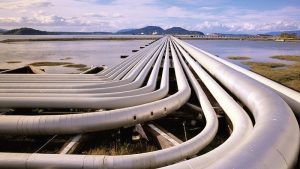Nigeria-Morocco gas pipeline project advances with 4 additional MoUs to boost economic development
June 16, 202316.4K views0 comments
By Onome Amuge
The Nigerian National Petroleum Company (NNPCL) alongside Morocco, has signed a total of four Memorandums of Understanding (MoU) with Cote d’Ivoire, Liberia, Benin, and Guinea as part of ongoing efforts to advance the Nigeria-Morocco Gas Pipeline Project.
The NNPCL, in a press release, disclosed that the signing took place on the sidelines of the Steering Committee meeting of the Nigeria-Morocco Gas Pipeline Project, held at the headquarters of the Economic Community of West African States (ECOWAS) in Abuja, marking an important step forward in the construction of a 5,600 km gas pipeline project that runs through 13 African nations, including Nigeria, Benin, Togo, Ghana, Cote d’Ivoire, Liberia, Sierra Leone, Guinea Bissau, Gambia, Senegal, and Mauritania, before ending in Morocco.
Business A.M gathered that the event was attended by representatives from ECOWAS and all the participating countries, including Nigeria, Benin, Togo, Ghana, Côte d’Ivoire, Liberia, Sierra Leone, Guinea, Guinea-Bissau, The Gambia, Senegal, Mauritania, and Morocco.
Read Also:
- Nigeria’s economic outlook darkens as IMF flags oil, global risks
- Development Finance Needs an Entrepreneurial Mindset
- National economic efficiency and naira-for-crude initiative
- Investing in Tomorrow: Tinubu's Blueprint for Youth Empowerment and…
- CPPE cautions against RMRDC bill’s 30% mandate, citing economic risks
“These tripartite MOUs were respectively and successively signed between the Nigerian National Petroleum Company Limited (NNPC) and the Office National des Hydrocarbures et des Mines (ONHYM) of Morocco on one hand, and the Société Nationale des Opérations Pétrolières of Cote d’Ivoire (PETROCI), the National Oil Company of Liberia (NOCAL), the Société Nationale des Hydrocarbures of Benin (SNH-Benin), and the Société Nationale des Pétroles of the Republic of Guinea (SONAP) on the other hand,” NNPCL stated.
According to the Nigerian oil company, the Memoranda of Understanding, similar to those signed with ECOWAS on September 15, 2022, Mauritania and Senegal on October 15, 2022, and The Gambia, Guinea-Bissau, Sierra Leone, and Ghana on December 5, 2022, reaffirm the commitment of the parties to this strategic project. It added that once completed, the project will enhance the monetization of the natural gas resources of the affected African countries and also offer a new alternative export route to Europe.
The project, when completed, is also expected to provide approximately three billion standard cubic feet of gas per day (3bscf/d) along the coast of West Africa, from Nigeria to the West African countries to the kingdom of Morocco, and then to Europe.
Prior to the current development, Nigeria and Morocco initially signed a Memorandum of Understanding on September 15, 2022, initiating the pipeline project.
The NNPCL highlighted the economic impacts of the project estimated to cost about $25 billion to include:
-Accelerate access to energy for all, improve the living conditions of the populations, integrate the economies of the sub-region, and mitigate desertification.
-Provide sustainable and reliable gas supply that aligns with the continent’s new environmental commitments, while providing Africa with a new economic, political, and strategic dimension.
-Create an opportunity for Nigeria to monetize its abundant hydrocarbon resources, by expanding access to energy to support economic growth, industrialization, and job creation across the African continent and beyond.
-Ensuring social and economic development through energy security and accessibility geared towards attaining total development of Africa by Africans.
-Strengthening the region’s electricity production/generation capacity, stimulating industrial and agricultural development, and contributing to the energy transition by using a source of energy that is cleaner than other fossil fuels.

